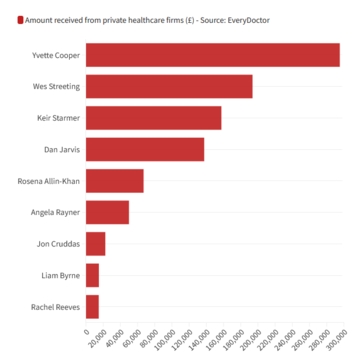Document:The Notional Health Service
| "Today is my 66th birthday, so I am hoping that you will forgive an article that is at core the anecdotal ramblings of an old man. Sixty years ago or so, when my siblings or I were sick enough to be in bed, my mother would phone the surgery and the GP would come to our home to see us. This was perfectly normal. It is probably difficult for Generation Z to believe this really used to happen." |
Subjects: National Health Service, Wes Streeting, Big Pharma, Keir Starmer, Yvette Cooper, mental health, lobbyist, nationalisation, privatisation
Source: Craig Murray's blog (Link)
★ Start a Discussion about this document
The Notional Health Service
Today is my 66th birthday, so I am hoping that you will forgive an article that is at core the anecdotal ramblings of an old man.
It was inspired by horror at Wes Streeting (I could end the sentence there but I shall continue it) ‘s plan to give weight loss jabs to the unemployed.[1]
The unemployed are more likely to be underweight than the population average, and this attempt to portray the unemployed as lazy couch potatoes is vile in many ways. Its masking as an “investment” in the economy by Big Pharma is chilling.
If it goes ahead, how many years do you think we are away from those who refuse to have the drug injected into their veins, having their benefits stopped?
How are we to view this attempt to use the “unproductive” as lab rats for Big Pharma?
It has also been announced that the government is to send employment advisers into mental health wards to try to get sick people back into work. This is astonishing. It is extremely difficult to access any mental health care at all on the NHS.[2]
To get residential care requires in truth a level of mental health crisis that indicates a threat to life of yourself or others. Yet people from mental health wards are going to be got into work, when there are hundreds of thousands of perfectly well people desperate for a good job who cannot find one?
What is the purpose of this nonsense other than propaganda and stigmatisation of the unemployed?
Which leads me to my anecdotes on the NHS and its purpose.
Sixty years ago or so, when my siblings or I were sick enough to be in bed, my mother would phone the surgery and the GP would come to our home to see us. This was perfectly normal. It is probably difficult for Generation Z to believe this really used to happen.
Now if I am sick enough to be in bed, I have to phone the surgery precisely at 8am and go through the lottery of getting in to the phone queue, rather than the engaged signal as the queue is at capacity. I may have to call numerous times.
If I do manage to get into the queue I have to hope I get to the front of it before all appointments are taken. If I fail, I cannot make an appointment for the next day but have to try my luck again then, once more at precisely 8am, while a hundred other people are trying exactly the same thing.
If I am fortunate enough to make it through the queue, I am de facto triaged by a receptionist with no medical qualifications but to whom I have to explain my medical symptoms.
She will then, if she thinks I have a case, explain my symptoms to a doctor and I may come out of this process, not with the doctor coming to my home, nor with me attending the surgery, but with a phone call from the doctor and a down the line diagnosis.
I find that everybody I have spoken to – and from all parts of the UK – have to put up with the same system. I cannot believe we have fallen in to accepting this.
It is not medical treatment. It is not a national health service, it is a notional health service.
If I feel really bad I can attempt to bypass the system and go to the hospital Accident & Emergency service, which I will find clogged with scores of other desperate people, waiting hours and hours to try to get medical attention.
I have not told this story before, but about three years ago I was invited to a party in Ealing after one of the Assange hearings. I had just one glass of wine and started to feel dizzy and nauseous, so I made my excuses and left.
I got a taxi back to the hotel near the Old Bailey where I was staying, but collapsed in the street just across from the hotel. I vomited and could not stand up. The problem was my heart condition. I phoned 999 and was told by the ambulance service it would be approximately three hours before an ambulance could reach me.
Passers by assumed I was a drunk or drug addict and gave me a wide berth. After a very cold half hour (it was I think February) a group of Irishmen stopped to help me and carried me into my hotel. I quite soon fell asleep on the bed and the next morning felt fine – and went back into court.
I spent several months this year living in Greece. I had very bad bronchitis and pitched up at the local rural medical centre, the equivalent of the GP surgery. I was seen immediately by two doctors, examined at length, x rayed and given an ECG and left with prescriptions, all within an hour of turning up.
Some months later I fell and dislocated my shoulder, in a highly remote rural location and after midnight. An ambulance arrived within half an hour and drove me for 90 minutes to the hospital in Volos, where my shoulder was reset.
Now here is the kicker. UK spending per capita on public healthcare[3] is twice Greek spending per capita on public healthcare.[4]
Yet while we spend twice as much, the experience of this patient (I did warn you this is going to be personal and anecdotal) is that key aspects of the Greek system are far better.
The NHS is in a state of near disaster. The reason is that it has been hollowed out for private profit, with the designated “profit centres” which give a high return hived off to private contractors (though not visibly to the patient), and the public purse left paying for the complicated and expensive bits.
Of course, we hear from those the wonderful stories of great care.
The reason we pay such a huge sum per capita for public healthcare – £3,600 a year for every man, woman and child in the UK – and get such a totally unacceptable service in return, is that private companies are sucking out the money for profit.
10% of NHS patients are in fact privately treated,[5] overwhelmingly for the cheapest and simplest problems, and private contractors suck 18% of the NHS budget.

I do not pretend that reform is not needed in the NHS – but getting out the private bloodsuckers and removing the profits would be a good first step.
Renationalisation of the NHS is urgently required.
If it were not so profitable then private healthcare lobbyists would not be bribing our politicians. Keir Starmer, Wes Streeting and Yvette Cooper have between them received over £750,000 from private healthcare lobbyists and companies.[6]
As with the Israel lobby, the essential corruption of our politics is what drives the entire policy agenda of the political class. There is an overwhelming case for banning elected policians and their parties from accepting large donations.
The chances of this happening short of a revolution are zero.
May I urge you to look at this video of the public meeting we held on the NHS during my Blackburn election campaign. Leaving aside my very obvious exhaustion, I was absolutely fascinated by the speeches of Mary Whitby and Dr Bob Gill.
Purely in terms of its content, I think pardoxically this small gathering was one of the best political meetings I have ever witnessed. I absolutely promise you it is worth your time and attention, and you will come out of it looking at the NHS in an entirely different light.
I most certainly did.
References
- ↑ "Unemployed could get weight loss jabs to return to work"
- ↑ "Mental health patients could get job coach visits"
- ↑ "Annual public healthcare spending per capita in the UK 2000-2023"
- ↑ "State of Health in the EU – Greece – Country Health Profile 2017"
- ↑ "What are the costs of privatisation in the UK’s healthcare system?"
- ↑ "This is how much Labour and Tory MPs get from private health firms"
